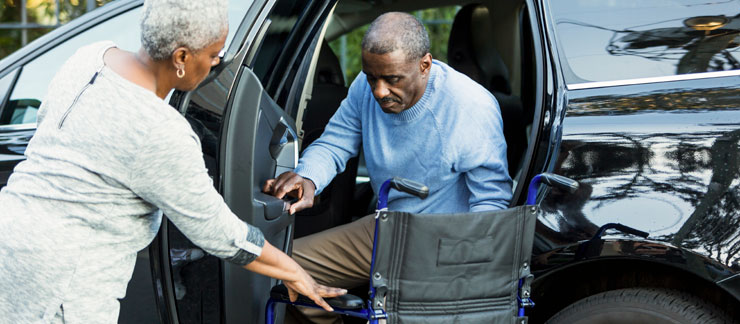
How to Talk to Your Loved One About Driving, Giving Up the Car Keys
It’s an uncomfortable situation, but role reversal usually is. At one time in your life, it was Mom and Dad granting or revoking your driving privileges. But as mom and dad age, we realize we have to revisit those tension-filled talks, only this time as the authority.
Nearly 80 percent of adult children call it the single most uncomfortable conversation they could have with their parents, according to a national poll commissioned by Visiting Angels.
In fact, about 25 percent of the adult children surveyed said they would avoid having this conversation altogether — despite safety concerns. But that’s dangerous, and the danger factor naturally increases for senior drivers as aging impairs a person’s reflexes,
Now the risk of trauma from even a minor accident is too big a gamble. Crashes are often fatal. In fact, senior drivers have higher rates of fatal crashes than almost any other group.
Nearly one in five fatal crashes in 2015 featured a driver who was 65 years or older, according to the Institute for Insurance Information.
Below, we’ve provided 9 signs that it is time for a senior to give up the car keys and how to begin the conversation.
9 Signs It’s Time to Start Driving the Conversation
For the safety of the elderly and everyone on the road, it is wise to have regular, frank discussions with mom, dad or that special senior in your life.
To start, develop a casual dialogue about the quality of his or her driving. Assess if the senior is losing confidence in his/her driving skills.
Your loved one should be aware of the potential dangers of extended driving, and understand there are solutions available. Meanwhile,
Your loved one may worry about how that change would impact his or her quality of life. A trusted spouse, adult child/caregiver or doctor may all be helpful in these talks.
Solutions like in-home care could ease you and your loved one’s mind, too. A professional caregiver could provide transportation for appointments,
Here are some sample conversation starters to break the ice, based on signs that National Highway Traffic Safety Administration advises family caregivers about:
Senior driver gets lost on familiar routes.
SAY: I’m worried about you getting lost when driving. Looks like you might have gotten distracted and confused. Tell me what happened. We can discuss some safer ways to get around without you getting behind the wheel.- Senior driver has a near-miss or a recent crash. Near-miss could involve hitting the curb or drifts between lanes.
SAY: I’m so glad no one was hurt. I don’t want to think about the possibility of you in an accident. Let’s talk aboutsafer way to travel. - Notice new dents and scratches in the car driven by the senior.
SAY: I noticed some new dents/scratches on your car. Tell me what happened. Let’s explore some safer ways of running errands without you driving. Senior driver gets a ticket for a driving violation.
SAY: I’m sorry you got a ticket.It been awhile since we talked about your driving. You wouldn’t have a ticket if you didn’t need to drive. So let’s find a better way.- Senior driver has a chronic health issue that’s become worse.
SAY: Seems like it’s time to check in with the doctor. We’ll get your health checked out. Then we’ll pick a way to get you around without you stressing about driving. Senior driver drives too slowly or speeds for no reason.
SAY: I feel scared for you when you’re not following the rules of the road. Driving too slowly or too fast is dangerous. I don’t want you or others hurt. Let’s look into ways to take you places without you driving.- Warning Sign: Senior driver ignores road signs and markings when driving.
SAY: When you ignore the signs of the road, it shows me your driving skills are waning and that’s totally OK and normal. There are ways to get you around without you having to drive yourself. - Warning Sign:
Senior driver is taking medication that may affect drivingsafely .
SAY: How are you feeling after taking the medication? I don’t think it’s safe to drive while you’re feeling the side effects. I’ll show you some other ways of getting to your errands. You’ll be much safer. - Warning Sign: Senior driver suffers from an illness that may affect driving skills.
SAY: The best thing is to focus on your recovery. Let’s not think about putting you in any more danger. I’ll show you some ways to get around town without you driving. It’s much safer. And you can relax and not worry.
A Nationally Uncomfortable Conversation
Visiting Angels commissioned a national survey of 400 adults whose parents are both living, 65 or older and currently driving.
Among the findings:
- 79% of adult children said telling parents they’re taking away the car keys because Mom or Dad is no longer fit to drive is the most uncomfortable conversation they could have
- 35% said no one should have the conversations with the parents
- 61% fear their parents will become depressed if they can’t drive
- 45% say it will in some way damage their relationship with their parents
- 42% say they worry they’ll now have to drive their parents around


